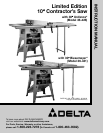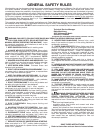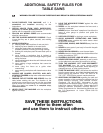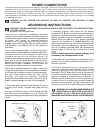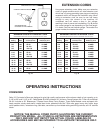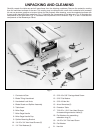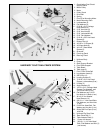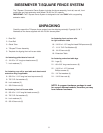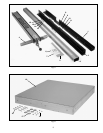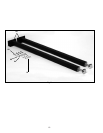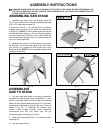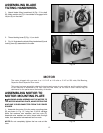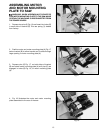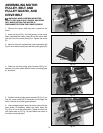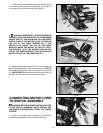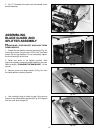
4
POWER CONNECTIONS
A separate electrical circuit should be used for your tools. This circuit should not be less than #12 wire and should be
protected with a time lag fuse. If an extension cord is used, use only 3-wire extension cords which have 3-prong
grounding type plugs and matching receptacle which will accept the machine’s plug. Before connecting the motor to
the power line, make sure the switch is in the “OFF” position and be sure that the electric current is of the same
characteristics as indicated on the machine. All line connections should make good contact. Running on low voltage
will damage the motor.
WARNING: DO NOT EXPOSE THE MACHINE TO RAIN OR OPERATE THE MACHINE IN DAMP
LOCATIONS.
GROUNDING INSTRUCTIONS
WARNING: THIS MACHINE MUST BE GROUNDED WHILE IN USE TO PROTECT THE OPERATOR FROM
ELECTRIC SHOCK.
Fig. A Fig. B
GROUNDED OUTLET BOX
CURRENT
CARRYING
PRONGS
GROUNDING BLADE
IS LONGEST OF THE 3 BLADES
GROUNDED OUTLET BOX
GROUNDING
MEANS
ADAPTER
A temporary adapter, which looks like the adapter
illustrated in Fig. B, may be used to connect this plug to a
matching 2-conductor receptacle as shown in Fig. B if a
properly grounded outlet is not available. The temporary
adapter should be used only until a properly grounded
outlet can be installed by a qualified electrician. The
green-colored rigid ear, lug, and the like, extending from
the adapter must be connected to a permanent ground
such as a properly grounded outlet box. Whenever the
adapter is used, it must be held in place with a metal
screw.
NOTE: In Canada, the use of a temporary adapter is not
permitted by the Canadian Electric Code.
3. Grounded, cord-connected tools intended for use on
a supply circuit having a nominal rating between 150 -
250 volts, inclusive:
If the tool is intended for use on a circuit that has an
outlet that looks like the one illustrated in Fig. C. The tool
will have a grounding plug that looks like the plug
illustrated in Fig. C. Make sure the tool is connected to
an outlet having the same configuration as the plug. No
adapter is available or should be used with this tool. If
the tool must be reconnected for use on a different type
of electric circuit, the reconnection should be made by
qualified service personnel; and after reconnection, the
tool should comply with all local codes and ordinances.
WARNING: IN ALL CASES, MAKE CERTAIN THE
RECEPTACLE IN QUESTION IS PROPERLY
GROUNDED. IF YOU ARE NOT SURE HAVE A
QUALIFIED ELECTRICIAN CHECK THE RECEPTACLE.
1. All grounded, cord-connected tools:
In the event of a malfunction or breakdown, grounding
provides a path of least resistance for electric current to
reduce the risk of electric shock. This tool is equipped with
an electric cord having an equipment-grounding
conductor and a grounding plug. The plug must be
plugged into a matching outlet that is properly installed
and grounded in accordance with all local codes and
ordinances.
Do not modify the plug provided - if it will not fit the outlet,
have the proper outlet installed by a qualified electrician.
Improper connection of the equipment-grounding
conductor can result in risk of electric shock. The
conductor with insulation having an outer surface that is
green with or without yellow stripes is the equipment-
grounding conductor. If repair or replacement of the
electric cord or plug is necessary, do not connect the
equipment-grounding conductor to a live terminal.
Check with a qualified electrician or service personnel if
the grounding instructions are not completely understood,
or if in doubt as to whether the tool is properly grounded.
Use only 3-wire extension cords that have 3-prong
grounding type plugs and matching 3-conductor
receptacles that accept the tool’s plug, as shown in Fig. A.
Repair or replace damaged or worn cord immediately.
2. Grounded, cord-connected tools intended for use on
a supply circuit having a nominal rating less than 150
volts:
If the tool is intended for use on a circuit that has an outlet
that looks like the one illustrated in Fig. A. The tool will
have a grounding plug that looks like the plug illustrated in
Fig. A.



